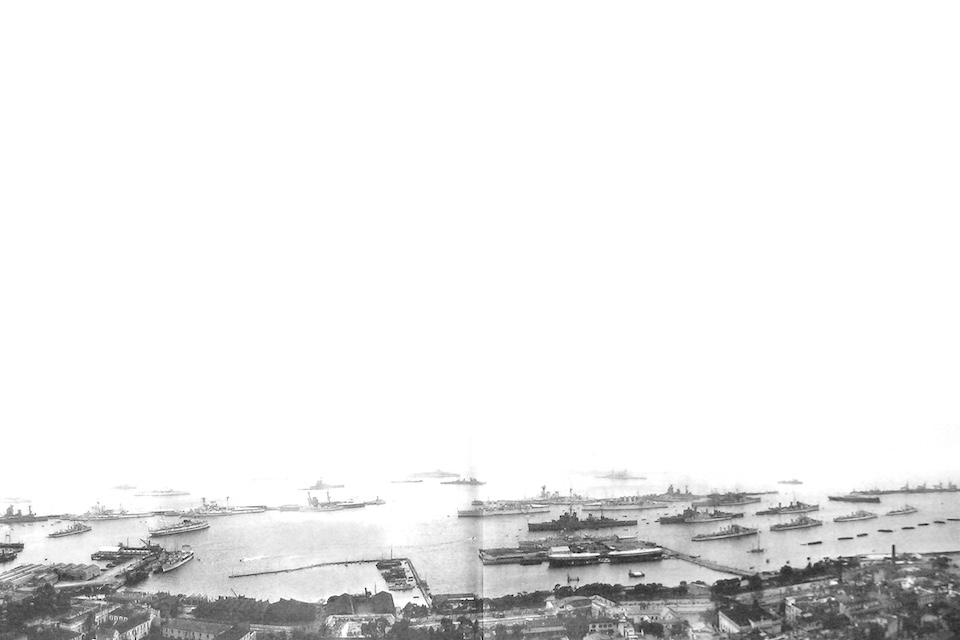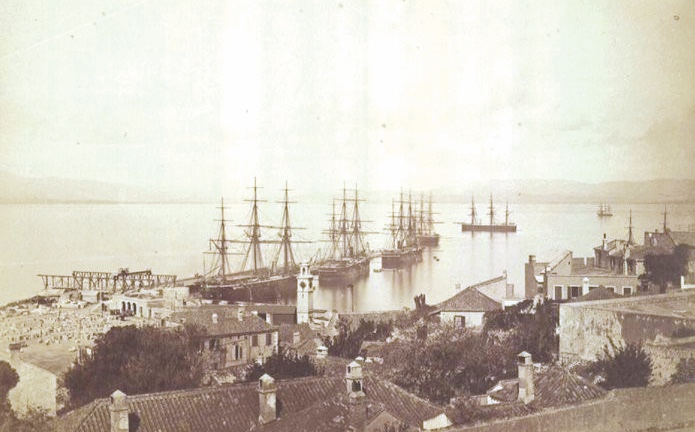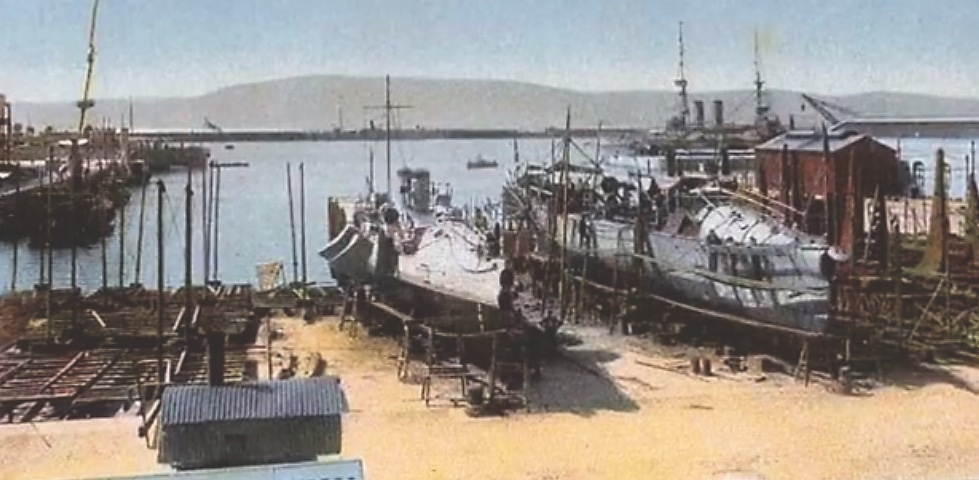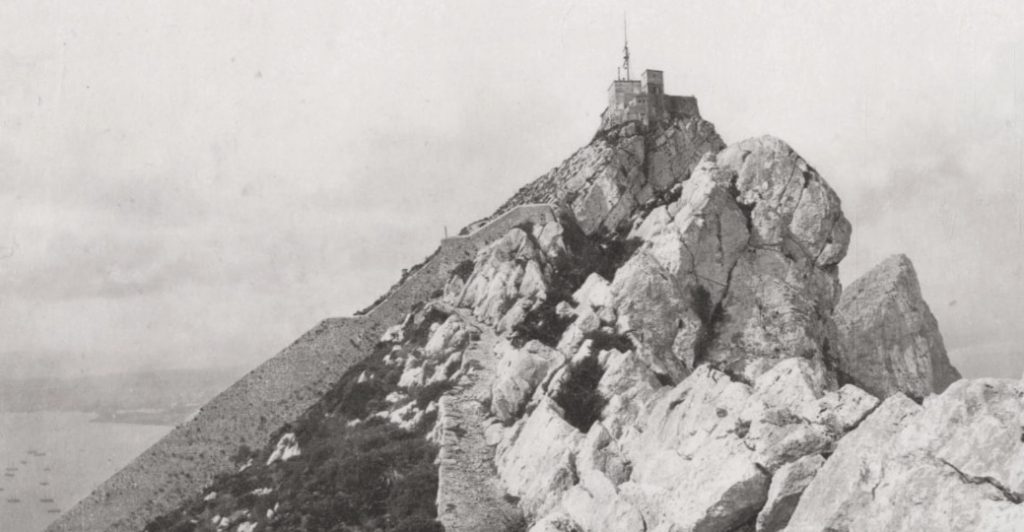March 30 – 1896
The following article, the first of a series on Gibraltar, is taken from
the Morning Post of that date
It has taken a long time for the British nation to rise to a full appreciation of the importance of the strategic position which Gibraltar holds. In one way, perhaps, this is not under an unalloyed evil. It is at any rate for certain that if the borrower awakening the of the country on the subject had taken place 10 years ago instead of today we should find ourselves at the present time provided with the docks which would be quite incapable of accommodating of huge battleships. This, however, is the only grain of comfort to be derived from an inexcusable delay. At first, no doubt, the national interest in possession of Gibraltar was to some extent sentimental. A British Fleet under Sir George Rooke had captured it during the War of the Spanish Succession in 1704; the Rock had been formally seeded to England by the Treaty of Utrecht in 1713; and there was a natural disinclination to surrender what had been hardly won, and had been formally recognized as a British Territory. Nelson ward, however, had exchanged it for Fort Mahon, in Minorca, on the ground that the latter, and infinitely better Harbour than Gibraltar could ever be made, and near to Toulon. William Pitt, too, had actually offered Gibraltar to Spain in return for their help in the recovery of Minorca. Happily Spain refused, and the fortress which Captain Mahan calls the watch tower from which England overlooks the road between the Mediterranean and the Atlantic, still flew as it still flies, the ensign of the union. In those days, however there was in the first place no Suez Canal and in the second plays we had been stiffened by war and were more inclined than we appear to be at present. To rely on the manhood of the nation to seize whatever we wanted in the event of war. Nowadays we are perhaps too much inclined to accept forth as the expression of energy, and a music hall enthusiasm as the outcome of a definite national sentiment. At any rate the conditions of warfare have altered. In 1759, two years after it had offered to exchange Gibraltar for assisting in obtaining mean older, Boscowen, who commanded in the Mediterranean, and whose ships had been a bit knocked about in an attack upon some French ships Toulon roads, took his whole fleet, which included 14 sail of the line as well as smaller vessels into Gibraltar to refit. De La Clue, the French Admiral at Toulon, hearing of this, sailed from the French arsenal with 12 line of battleships, and made his way into the Atlantic. His passage through the Strait had, however been observed and Boscowen followed, attacked and defeated him. Five of the ships put into Cadiz, and of the remainder two escaped, a fact which they had to thank the magnificent gallantry of a third which fought for 5 hours against enormous odds and surrendered only when in a sinking condition. The Moral of the French navy in those days was far superior to what it was during the revolutionary wars, though even then in spite of the fact that we established the prestige of victory, we could never afford to undervalue our foes. Of the other four ships, two were captured and two were burnt. Here we have an instance of the succour afforded by Gibraltar to a British Fleet and of the strategic value of the Rock. A few days again before the Battle of Trafalgar, Nelson sent five line of battleships to Gibraltar to refit and re-victual, with instructions to return as soon as possible. It is said that the thunder of the canonade of the decisive contest reached the years of the captain and crew, and that sail was immediately made and the ship’s heads directed towards the sound of the firing in order to rejoin the flag. The Donegal, commanded by Sir Pulteney Malcolm, hailed the first British ship she met for news, and the answer was, 19 sail of the line taken and Lord Nelson killed. The details of the story may go for what they are worth. The tale is correct in its main particulars and it emphasises the importance of Gibraltar at that time of the base.
Modern developments of construction and armament has not diminished this importance, but they have altered the methods of its application. Boscowen’s squadron, Nelson’s ships, could rely largely upon their own crew for all that was required in order to refit them. There was in those days, no danger of torpedo attack; there were no shell bursts in board. After the next great action however things will be entirely changed and the repairs which will be necessary will have to be carried out on a scale which will far transcend the resources of the skilled artisans on board the ships themselves. For this cause alone docking will be necessary, while to allow ships to lie in an exposed anchorage would be simply two invite the attacker of torpedo boats. If, as has been said the delay which has taken place in the provision of suitable accommodation is not an unalloyed evil, successive governments and successive the Board of Admiralty can hardly be held blameless for not having risen to the level of their responsibilities, which have continuously increased ever since steamer was introduced as the motive power of warships. In the olden days of sailing ships Gibraltar to some limited extent and no more, commanded the straits and it has often been said that the prevailing wind and the set of the current compelled a large number of ships seeking to pass between the Pillars of Hercules to come within range of its guns. Even allowing for the increased power of modern weapons, steam has altered this position issued if it ever really existed. It is easy for a ship or squadron to pass between Europe and Africa beyond all affected range of the guns of Gibraltar. The Rock is valuable as a post of observation from which everything can be seen by day and from which, if it ever really exists everything can be discovered by night by means of swift very small cruisers. In time of war, in fact no vessel should past Gibraltar either by day or by night without the authorities being aware of it. Here what may be described as the remnants of its ancient utility came to an end. Beyond this, however arises its modern usefulness which may be comprised in the statement that it is necessary to great Britain’s naval position that she should possess suitable dock accommodation in the vicinity of the Western entrance to the Mediterranean. It is somewhere about half a century since Sir William Parker, then commander in chief in the Mediterranean, recognized the growing importance of Gibraltar as a naval station in view of the rapid increase of steamships, and urged his view upon the Admiralty. In March 1891 a question on the subject was asked in the House of Lords, and this was far from being the first occasion on which the matter was brought forward in parliament. A committee had at that time investigated the subject, and had reported in the previous September. The report recommended the creation of a dock, a prolongation of the New Mole. No vote however was proposed in the estimates are for the year, there being so many more pressing an important matters to be considered. Happily we have arrived at a more just appreciation of matters which are pressing an important in their relation to the nation’s welfare. In the estimate for 1893 to 1894 provision was made for the extension of the New Mole and for the expenditure of a certain sum which was assuredly not spent before it was needed, for the improvement of the magazines. A year later we heard of the further elongation of the mole at Gibraltar, which, when completed will be 3700 feet in length and also of the proposal to commence at once and graving dock at Gibraltar. By 1895 to 1896 a more extensive scheme had been elaborated and so now we have a proposal to build three docks instead of one, to still further extend the mole and to create an enclosed Harbour. To this plan there is only one objection, which will be discussed here after. Apart from that, the schema of the government is calculated to strengthen very materially our position in regard to any action which might be fought within 300-400 miles on either side of the Strait of Gibraltar. Suppose that we were at war with France, it would hardly be possible to send ships not perhaps under complete control from Malta, on the other hand or to Devenport on the other for repair. The risk of running the gauntlet of the French torpedo boats from Southern France, from Corsica, from North Africa on the one hand or from the whole of the western coast of France on the other would be too great. Gibraltar then would furnish us with our repairing and with our coaling station. Let us see then what it is proposed to do at Gibraltar. The present Anchorage is wholly unsafe it is exposed to south westerly gales, and from these the so called New Mole did not protect it. This mole is a construction stretching on the western side of Gibraltar in a north westerly direction from a small natural cape near the town. It is supposed to be an adjunct of the dockyard so called, it is believed, because all docks and all appliances for fulfilling the ordinary repair function of the dockyard are wanting. It has its origins in 1620 and from that time until 1851 it was only 300 feet long. Then it was extended to about ¼ mile, and at this point it has since remained. The dockyard, such as it is, is to be found at the junction of the New Mole with the mainland. Alongside the mole as it existed a year or two ago, a couple of battleships and a smaller vessel might perhaps be moored. The Anchorage, who’s bad holding ground is notorious, could have taken the remainder of a small squadron, but there were, and there are, no facilities for repair whatsoever. It is now proposed to extend the New Mole for a very considerable distance, so that it shall not only enclose a large amount of sea space but shall afford a great deal of jetty room. At the same time a detached mole is to be constructed, and either a commercial coaling mole, now under consideration, will be built, or other precautions will be taken to render the Harbour, whose entrance will be at the northern end, secure against torpedo boat attack. Within the space thus to be enclosed, on the New Mole Parade, a dock is already in course of excavation, and its length is to be increased to such an extent as to enable it, under certain circumstances, to accommodate two ships at once. Two smaller dry docks of smaller size are also to be constructed and it is to be presumed that these stocks will not be made without due provision for the repair of any ships that may be placed in them. When, therefore, the works are complete and their cost is estimated to be roughly speaking three million pounds, of which rather more than one third is to be spent within the present century, we shall have at Gibraltar a made Harbour with adequate protection from the torpedo boat attacks, three docks, and presumably repairing facilities adequate to a dock system of this magnitude. If we could say this and nothing more it would be obvious that our position in Western Mediterranean would be greatly improved, but it remains to consider what are the disadvantages of a scheme whose adoption must be regarded as inevitable rather than as voluntary.
The Central News says in pursuance of the policy recently expounded by our Mr. Goschen in the navy estimates are, and by Earl Spencer during his term of office at the Admiralty, a number of distinguished officers and officials connected with the Admiralty will proceed upon a tour of inspection of the Mediterranean stations. Rear Admiral Sir Frederick Bedford KCB., Mister J. Austin Chamberlain MP, Mr. William McCartney MP of the Board of Admiralty, Major Raban, royal engineers, director of engineering and architectural works, captain Gallagham, RN, Naval Adviser to the Inspector General of Fortification, and Mr. York and Mr. Pell, of the Secretary’s Dept of the Admiralty, will proceed to Malta and Major Pilkington, Royal Engineers to Gibraltar. They were to sail from Tilbury Docks on a Friday last on board the P&O Steamer Britannia, due here tomorrow.











